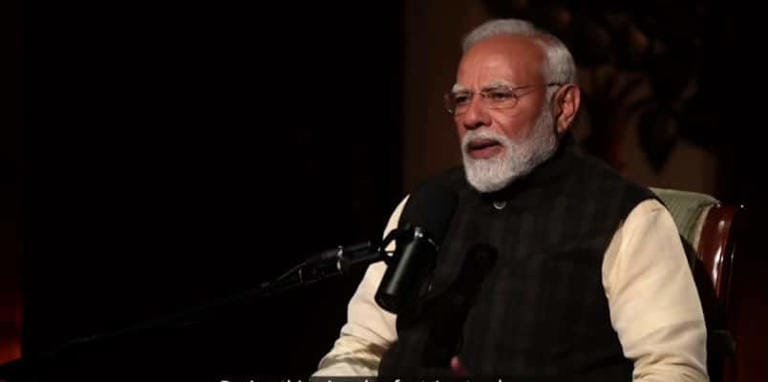On March 16, 2025, Prime Minister Narendra Modi joined renowned AI researcher and podcaster Lex Fridman for a nearly three-hour conversation that offered a rare glimpse into his personal journey, leadership philosophy, and vision for India. Released on Fridman’s widely followed podcast, the episode covered an array of topics—from Modi’s humble beginnings to his views on global diplomacy, technology, and cultural heritage. Fridman described the discussion as one of the most powerful experiences of his life, a sentiment echoed by Modi, who called it a “fascinating conversation.” Here are the key highlights from this engaging exchange.
A Childhood Rooted in Simplicity
Modi opened up about his early life in Vadnagar, Gujarat, painting a vivid picture of a childhood marked by poverty yet devoid of its burdens. Growing up in a small home without windows, he shared how his family lived simply, with little exposure to material comforts. “We never felt the burden of poverty because we had no means of comparison,” he said, reflecting on how the absence of luxuries like shoes shaped his resilience. This grounding, he suggested, influenced his approach to leadership, emphasizing empathy and perseverance.
The Himalayan Journey and Spiritual Discipline
The Prime Minister recounted his transformative years in the Himalayas, a period of introspection that sharpened his focus and purpose. He tied this to his practice of fasting, which he described as more than a physical act—it’s a discipline that heightens awareness and clarity. Responding to Fridman, who fasted for two days in preparation for the interview, Modi explained how such practices refine the senses and foster mental strength, offering insight into his personal habits that sustain his demanding role.
RSS and Hindu Nationalism
Modi spoke candidly about his deep ties to the Rashtriya Swayamsevak Sangh (RSS), crediting the organization with giving him a sense of purpose. He described the RSS, active since 1925, as a force that inspires dedication to the nation across various fields. Addressing Hindu nationalism, he framed it within India’s diverse cultural tapestry, emphasizing that his leadership draws strength from the country’s pluralistic heritage, exemplified by figures like Gautama Buddha and Mahatma Gandhi.
Leadership Backed by 1.4 Billion Indians
A recurring theme was Modi’s view of himself as a representative of India’s 1.4 billion people rather than an individual figure. “When I shake hands with a world leader, it’s not Modi, but 1.4 billion Indians doing so,” he asserted. He rejected the notion of ruling through fear, instead rooting his strength in India’s ancient culture and collective spirit. This perspective, he argued, shapes his governance and foreign policy, prioritizing mutual respect and global welfare over dominance.
Diplomacy and Global Relations
Modi touched on India’s relationships with key nations, offering nuanced insights. He praised US President Donald Trump’s resilience and decisiveness, recalling their bond during the 2019 “Howdy, Modi” event in Houston, where Trump joined him in addressing a packed stadium. On India-Pakistan ties, he expressed hope for peace but urged Pakistan to abandon state-sponsored terrorism, citing past gestures like inviting Pakistani leaders to his 2014 swearing-in. Regarding China, he acknowledged the post-2020 border tensions but highlighted efforts to restore trust, emphasizing the shared ancient legacies of both nations as a foundation for cooperation.
Reflections on the Gujarat Riots
Addressing the 2002 Gujarat riots, which occurred during his tenure as Chief Minister, Modi called it a “tragedy of unimaginable magnitude” where people were burned alive. He challenged the narrative that it was among the largest riots, labeling it misinformation, and noted that courts had upheld his administration’s innocence. This moment underscored his sensitivity to historical perceptions while defending his record.
Technology and AI’s Future
On artificial intelligence, Modi was optimistic yet grounded, asserting that “AI will remain incomplete without India.” He argued that no technology can surpass human creativity, positioning India as a vital player in the global tech landscape due to its talent and innovation. This ties into his broader vision of India as a leader in the digital age, balancing tradition with modernity.
Criticism as the Soul of Democracy
Modi welcomed criticism as an essential pillar of democracy, stating, “Criticism is the soul of democracy. It helps refine governance and decision-making.” This openness, he suggested, keeps his leadership dynamic and responsive, reflecting his belief in dialogue over authoritarianism.
A Lighthearted Moment with Obama
Adding a touch of humor, Modi recalled a White House dinner with President Obama where his fasting habits puzzled the staff. When offered only hot water, he quipped to Obama, “Look, my dinner has arrived!” The anecdote highlighted his ability to connect personally with world leaders, blending discipline with relatability.
Football and Unity
Modi shared an inspiring story about a tribal village in Madhya Pradesh dubbed ‘Mini-Brazil’ for its passionate football culture, producing national-level players across generations. He tied this to his belief in sports as a unifying force, noting the growing popularity of football in India and the success of its men’s and women’s teams.
This podcast revealed Modi as a leader shaped by hardship, spirituality, and an unwavering commitment to India’s collective strength. From personal anecdotes to geopolitical insights, the conversation underscored his multifaceted approach—rooted in tradition, yet forward-looking—offering listeners a deeper understanding of the man steering one of the world’s largest democracies.
